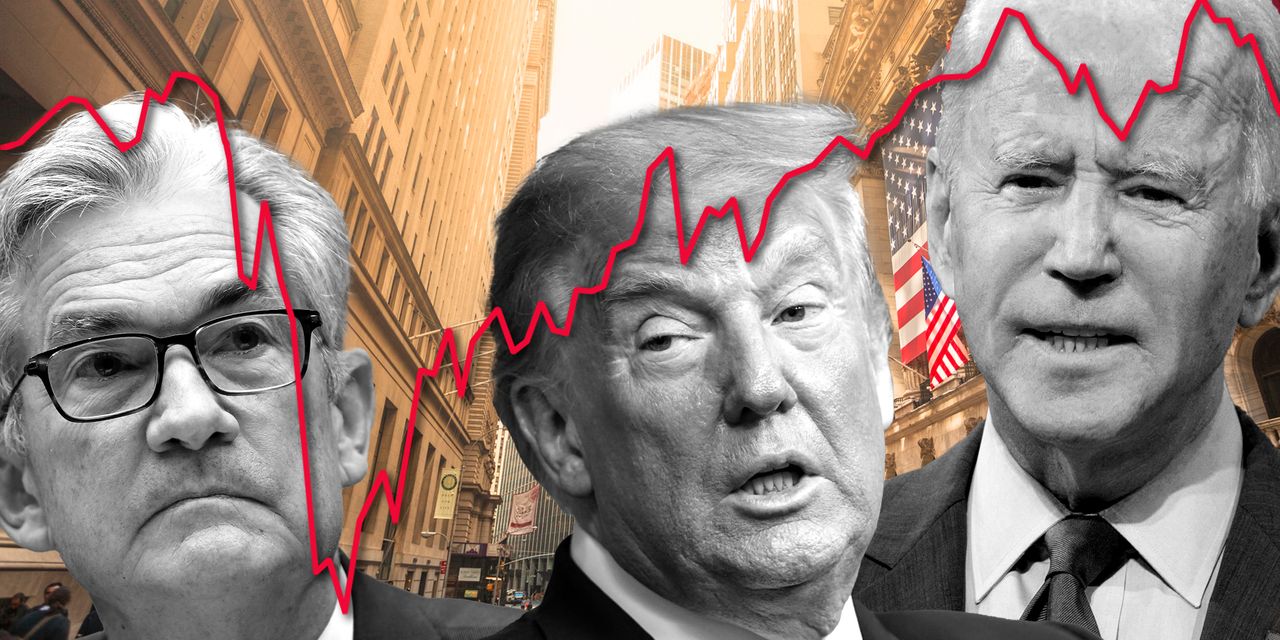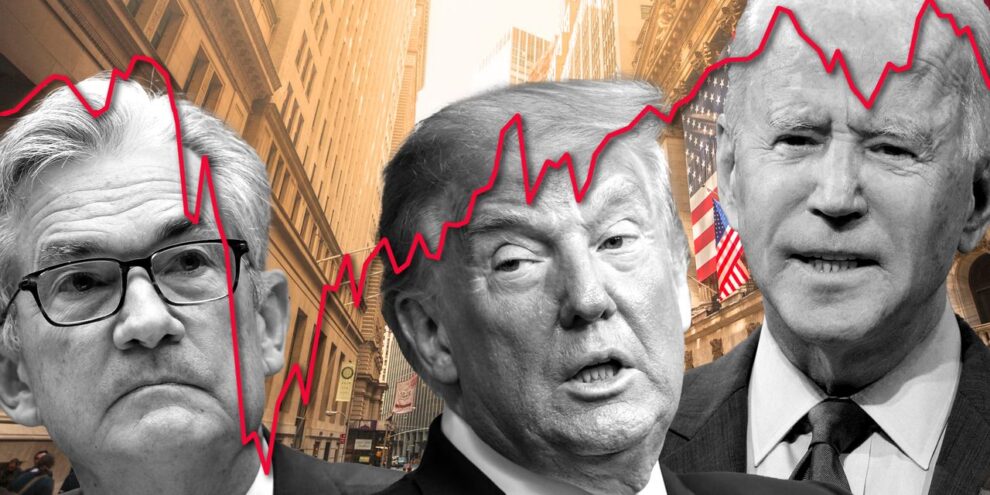
Could the 2020 U.S. presidential election be the most highly wagered on event in history?
The Nov. 3 vote has tallied over $260 million in wagers thus far, according to Pete Watt, spokesman for OddsCheckerUS, during a Wednesday interview on “The Dan Abrams Show” on SiriusXM.
That means bets on the political race between President Donald Trump and former Vice President and Democratic challenger Joe Biden already have surpassed total wagers on high-profile sporting events, like the National Football League’s Super Bowls, the National Basketball Association finals, and big ticket boxing matches, Watt says.
But there are, gargantuan sums at stake on Wall Street too, and this coming week could represent the moment of truth for traders who have been rattled recently in the lead-up to the highly anticipated election.
The Dow closed 6.5% lower for the past week and the S&P 500 lost 5.6% over the same stretch, while the Nasdaq skittered 5.5% lower.
However, it isn’t just political agita that this week drove the Dow Jones Industrial Average DJIA, -0.59%, the S&P 500 index SPX, -1.21%, and the Nasdaq Composite Index COMP, -2.45% to register their worst weekly tumbles since March—there’s been a resurgence of the coronavirus pandemic too.
Traders this coming week confront the prospect in some U.S. states of a return to business shutdowns like those seen in March as COVID-19 cases rise to daily records.
Stephen Dover, head of equities at Franklin Templeton, put it this way: “This next week will be a confluence of market driving events: of course the election, stimulus, earnings and growing Covid infections.”
Key events of the coming week include the U.S. election results on Tuesday, an update from the Federal Reserve at its Wednesday and Thursday meeting, and the jobs report for October from the U.S. Labor Department on Friday.
“Next week is going to be a volatile week for the market given all the big events,” Lindsey Bell, chief investment strategist at Ally Invest, told MarketWatch.
Will Trump overcome betting odds and the opinion polls to stage a comeback in the electoral college against Biden as he did in 2016? Or will the Congressional races amount to a so-called blue wave in Washington, resulting in a Democratic sweep of both the White House and Congress that may usher in another broad fiscal relief package to combat the economic harm from the pandemic ?
“If the Democrats gain a strong majority in the Senate there is likely to be more legislation that will affect the markets and there will be sentiment shifts in many sectors of the market,” Franklin Templeton’s Dover explained.
Specifically, Dover thinks the congressional races could prove a source of jitters for markets into late November and beyond, pressuring stocks lower.
“It is likely that we will not know the final Senate results on Tuesday evening,” Dover told MarketWatch, while warning that uncertainty could “add to volatility in the market until resolved which, because of runoff races, might not be resolved until January.”
It is a point that can’t be overstated: the investment community hates the unknown.
Ally Invest’s Bell ranks the political race as the key issue next week, perhaps even above the second or third wave of COVID-19 cases in the U.S. and in major cities in Europe.
“I believe the election will be the key driver of next week’s action,” Bell said. “That’s because the election has the most consequential near-term and long-term implications for the market,” she said, while pointing out that investors will be looking to adjust their portfolios based on its outcome.
However, Katie Nixon, chief investment officer at Northern Trust Wealth Management, views the deadly pandemic as trumping all other market risk factors.
“Given the global ‘risk off’ tone of the market this week, it is clear that the rise in Covid-19 cases across Europe and the U.S. has taken center stage in terms of key risk factors,” she wrote in a Friday research note.
“With memories of March and April fresh in investors’ minds, many are fearful of a repeat, and this fear has been supported by the announcement of various restrictive measures taken across Europe.”
Against that backdrop, the Federal Reserve’s two-day Nov. 4-5 policy meeting and the nonfarm payrolls report on Friday, usually a pivotal market driver, could end up being a sideshow to the election and the coronavirus.
The barrage of factors already has investors bracing for wild swings in the coming week. The Cboe Volatility Index VIX, +1.14%, a gauge of implied moves in the stock market, soared to the highest level since around June, closing Friday out at around 38.02, or well above its historical average at around 19. The volatility index tends to rise when markets fall, therefore can be used by some traders as a hedge against coming equity market drops.
Could there be a big tumble coming, considering the treacherous wall of worry markets must scale now? Northern Trust’s Nixon, doesn’t think so.
“This is unlikely for a few key reasons: First, the panic during March was exacerbated by the tremendous uncertainty related to the virus. We know more today about the epidemiology, we have more advanced and effective treatments, and we sit perhaps weeks away from the announcement of a vaccine,” she explained.
Independent market technician Mark Newton thinks otherwise and sees November and parts of December as vulnerable to post-election rockiness.
“Markets are likely to fall into late [November] or even Dec 21-22, but could have a reprieve from Wed-Friday where bounces are possible,” the market technician said. But he also sees late November as potentially ripe for a “particularly bearish” run for equities.
“Lots of volatility and [I] wouldn’t’ be surprised to see SPX 2900,” Newton wrote.
Furthermore, Newton speculates that new highs for stocks won’t be achieved in 2020 and sees a high likelihood of a contested election, which many expect because of the slow process of counting mail-in ballots, among other issues.
But after the uncertainty lifts, perhaps, there will be a newfound path forward for investors over the longer term, as Bell at Ally Invest expects.
“Right now, we’re bracing for more rough days ahead, but we’re feeling good about the earnings outlook. Earnings can help drive the market after this particular storm, too,” the analyst explained.
“Believe it or not, reports from nearly 60% of S&P 500 companies have shown that U.S. companies are in the midst of a comeback,” she said, adding that “2021 continues to look promising.”
How much of comeback may be partially determined next week.











Add Comment